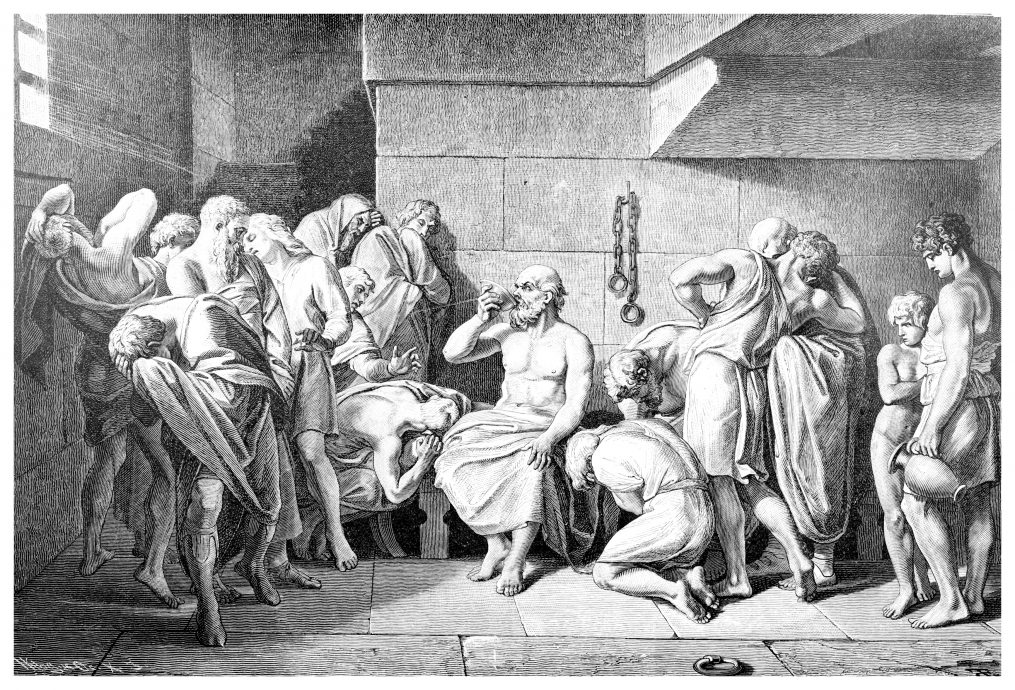Killing Socrates
Marco Rubio demonstrated keen political instincts during one of the primary debates when he used his opening remarks to argue for an end to the stigmatization of vocational training, handily linking the stigmatization to the minimum wage and America’s flagging economy. He demonstrated that he can hit the right notes while engaging in a kind of populist rhetoric that could bring the Carson and Trump voters toward him—which he must do if he expects to have a serious shot at the nomination.
Clearly, the candidate knows how to spontaneously craft statements that allow his target audience to see a bigger picture. But is the picture he draws here big enough? In saying “we need less philosophers and more welders” (he meant “fewer”), Rubio slights the foundational premise of a free society.
Perhaps the events of the past few weeks will give rise to more reflection on his part. From Claremont McKenna College in California to the University of Missouri to Yale, bastion of the Ivy League, American higher education is in the midst of a 1960s-style intellectual meltdown. The liberal arts—Rubio’s bete noire of the moment—are the cure for this disease. Liberal arts, that is, properly pursued.
Colleges and universities are in turmoil precisely because too many Americans think of them as places for job training instead of for examining the great questions. This change has at once lowered the quality of the curriculum and raised the cost of higher education. Worse, the careerist thinking has helped radical thought thrive on the campuses. The more tradition-minded administrators, and the people footing the bill (the parents), believed they could safely ignore the trendy nonsense being purveyed by a few cranks in the academic world—after all, they weren’t teaching the “important” subjects like business or economics.
If the English, history, or philosophy departments got weird and sprouted a few out-of-the-mainstream subfields like “Gender Studies” or “Ethnicity, Race and Migration” (a real major at Yale), what did it matter to them? Their sons and daughters could get a few easy A’s writing papers for introductory courses that would make for entertaining fodder around the dinner table at home during school breaks. These intellectual ghettos would attract and retain a certain kind of student with the means to support his activism habit at an expensive university. Meanwhile leaving the pre-professional programs to grow, without having to engage in the mentally taxing fight for the liberal arts.
Those who deprecate the liberal arts in favor of the utilitarian view of a college degree place themselves in the same camp as those at Yale, Claremont, and Missouri who demand censorship of ideas and arguments that run counter to their own. Like the ancient Athenians, both the “pragmatists” and the politically correct hysterics would rather kill Socrates than let him talk anymore. To the former, the philosopher is useless; to the latter, the philosopher is evil. Both want the philosopher ejected.
Today we are reaping the rotten harvest of the intellectual abdication of the 1950s and 1960s, when more and more people had access to the universities but discovered, much to their dismay, that learning is hard. As “respectable and responsible” families elected to have their college-educated children pursue sheepskins with a pathway to jobs, and abandoned the liberal arts as “impractical,” it gave cover to radicals with academic pretensions. Their grievance-mongering having sunk in only too well, the tenured radicals now face student bodies with lists of grievances that include all the usual stuff (eradication of racism, sexism, homophobia) with certain add-ons (college should be provided free of charge in the future, and past student debts should be wiped off the books).
Too many conservatives today are ignorant of this history and think that the answer to our current woes is to demand more of the same “cure” that made us sick. Rubio and the utilitarians fail to realize, moreover, that they are insulting welders and students of philosophy alike.
Worst of all is the damage done to the prospects of self-government. A republic requires more of its educational institutions than producing skilled workers to grow the GDP. It requires responsible human beings and citizens. Such persons are made, not born. Their rights may be inherent, but the skills required to understand, preserve, and defend them are the study and the practice of a lifetime.
Welders, no less than philosophy students, need an appreciation and respect for the making of human beings and citizens. And any properly trained student of philosophy will understand and appreciate the contributions of welders (and all the other manual trades) to the engine of democracy. D-Day didn’t happen just because military strategists drew up the plans on paper, after all. It required equipment designed, manufactured, tinkered with, and repaired by a free and innovative people to execute it. But it also took a real sense of justice and injustice that was understood and appreciated by all varieties of our people. And it took men who, understanding that, were willing to die lest they be slaves.
Where does Senator Rubio think this moral sense originates if not in philosophy?
Human beings are more than workers narrowly focused on the details of their specific fields. A welder can also read and be conversant in philosophy, know how to play the guitar, change the oil in your car, have an opinion on the best way to grow tomatoes, tell a funny story about Will Rogers, easily rattle off the latest football standings, and bake a great apple pie. We are all more than our jobs. Human beings are at their happiest and most successful when they are well-rounded. A liberal arts education gives them the tools to become that way.



